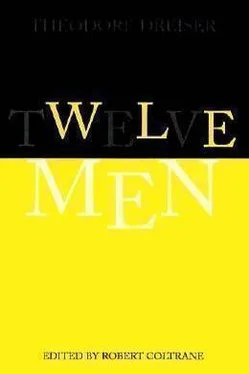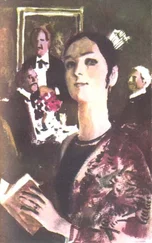Теодор Драйзер - Twelve Men
Здесь есть возможность читать онлайн «Теодор Драйзер - Twelve Men» весь текст электронной книги совершенно бесплатно (целиком полную версию без сокращений). В некоторых случаях можно слушать аудио, скачать через торрент в формате fb2 и присутствует краткое содержание. Год выпуска: 2014, Издательство: epubBooks Classics, Жанр: Биографии и Мемуары, на английском языке. Описание произведения, (предисловие) а так же отзывы посетителей доступны на портале библиотеки ЛибКат.
- Название:Twelve Men
- Автор:
- Издательство:epubBooks Classics
- Жанр:
- Год:2014
- ISBN:нет данных
- Рейтинг книги:4 / 5. Голосов: 1
-
Избранное:Добавить в избранное
- Отзывы:
-
Ваша оценка:
- 80
- 1
- 2
- 3
- 4
- 5
Twelve Men: краткое содержание, описание и аннотация
Предлагаем к чтению аннотацию, описание, краткое содержание или предисловие (зависит от того, что написал сам автор книги «Twelve Men»). Если вы не нашли необходимую информацию о книге — напишите в комментариях, мы постараемся отыскать её.
Twelve Men — читать онлайн бесплатно полную книгу (весь текст) целиком
Ниже представлен текст книги, разбитый по страницам. Система сохранения места последней прочитанной страницы, позволяет с удобством читать онлайн бесплатно книгу «Twelve Men», без необходимости каждый раз заново искать на чём Вы остановились. Поставьте закладку, и сможете в любой момент перейти на страницу, на которой закончили чтение.
Интервал:
Закладка:
I mention this merely to indicate the character of a long series of such events which covered the years 19— to 19—. During that time, for the reason that I have first given (his curious pleasure in my company), I was part and parcel of a dozen such more or less vivid affairs and pleasurings, which stamped on my mind not only X― but life itself, the possibilities and resources of luxury where taste and appetite are involved, the dreams of grandeur and happiness which float in some men's minds and which work out to a wild fruition—dreams so outré and so splendid that only the tyrant of an obedient empire, with all the resources of an enslaved and obedient people, could indulge with safety. Thus once, I remember, that a dozen of us—writers and artists—being assembled in his studio in New York one Friday afternoon for the mere purpose of idling and drinking, he seeming to have nothing better to do for the time being, he suddenly suggested, and as though it had but now occurred to him, that we all adjourn to his country house on Long Island, which was not yet quite finished (or, rather, furnished), but which was in a sufficient state of completion to permit of appropriate entertainment providing the necessaries were carried out there with us.
As I came to think of this afterward, I decided that after all it was not perhaps so unpremeditated as it seemed and that unconsciously we served a very useful purpose. There was work to do, suggestions to be obtained, an overseer, decorator and landscape gardener with whom consultations were absolutely necessary; and nothing that X― ever did was without its element of calculation. Why not make a gala affair of a rather dreary November task—
Hence—
At any rate the majority of us forthwith agreed, since plainly it meant an outing of the most lavish and pleasing nature. At once four automobiles were pressed into service, three from his own garage and one specially engaged elsewhere. There was some telephoning in re culinary supplies to a chef in charge of the famous restaurant below who was en rapport with our host, and soon some baskets of food were produced and subsequently the four cars made their appearance at the entryway below. At dusk of a gray, cold, smoky day we were all bundled into these—poets, playwrights, novelists, editors (he professed a great contempt for actors), and forthwith we were off, to do forty–five miles between five–thirty and seven p.m.
I often think of that ride, the atmosphere of it, and what it told of our host's point of view. He was always so grave, serene, watchful yet pleasant and decidedly agreeable, gay even, without seeming so to be. There was something so amazingly warm and exotic about him and his, and yet at the same time something so cold and calculated, as if after all he were saying to himself, "I am the master of all this, am stage–managing it for my own pleasure." I felt that he looked upon us all not so much as intimates or friends as rather fine birds or specimens of one kind and another, well qualified to help him with art and social ideas if nothing more—hence his interest in us. Also, in his estimation no doubt, we reflected some slight color or light into his life, which he craved. We had done things too. Nevertheless, in his own estimation, he was the master, the Can Grande. He could at will, "take us up or leave us out," or so he thought. We were mere toys, fine feathers, cap–and–bell artists. It was nice to, "take us around," have us with him. Smothered in a great richly braided fur coat and fur cap, he looked as much the Grand Duke as one might wish.
But I liked him, truly. And what a delicious evening and holiday, all told, he made of it for us. By leaving a trail of frightened horses, men and women, and tearing through the gloom as though streets were his private race–track—I myself as much frightened as any at the roaring speed of the cars and the possibilities of the road—we arrived at seven, and by eight were seated to a course dinner of the most gratifying character. There was no heat in the house as yet, but from somewhere great logs had been obtained and now blazed in the large fireplaces. There was no electricity as yet—a private plant was being installed—but candles and lamps blazed in lovely groups, casting a soft glow over the great rooms. One room lacked a door, but an immense rug took its place. There were rugs, hangings and paintings in profusion, many of them as yet unhung. Some of the most interesting importations of furniture and statuary were still in the cases in which they had arrived, with marks of ships and the names of foreign cities upon the cases. Scattered about the great living–room, dining–room, music–room and library were enough rugs, divans and chairs as well as musical instruments—a piano among others—to give the place an air of completeness and luxury. The walls and ceilings had already been decorated—in a most florid manner, I must say. Outside were great balconies and verandahs commanding, as the following morning proved, a very splendid view of a very bleak sea. The sand dunes! The distant floor of the sea! The ships! Upstairs were nine suites of one– and two–rooms and bath. The basement was an intricate world of kitchen, pantry, engine–room, furnace, wine cellars and what not. Outside was a tawny waste of sand held together in places in the form of hummocks and even concealing hills by sand–binding grasses.
That night, because it was windy and dull and bleak, we stayed inside, I for one going outside only long enough to discover that there were great wide verandahs of concrete about the house, fit for great entertainments in themselves, and near at hand, hummocks of sand. Inside all was warm and flaring enough. The wine cellar seemed to contain all that one might reasonably desire. Our host once out here was most gay in his mood. He was most pleasantly interested in the progress of his new home, although not intensely so. He seemed to have lived a great deal and to be making the best of everything as though it were something to go through with. With much talking on the part of us all, the evening passed swiftly enough. Some of the men could play and sing. One poet recited enchanting bits of verse. For our inspection certain pieces of furniture and statuary were unpacked and displayed—a bronze faun some three feet in height, for one thing. All the time I was sensible of being in contact with some one who was really in touch with life in a very large way, financially and otherwise. His mind seemed to be busy with all sorts of things. There were two Syrians in Paris, he said, who owned a large collection of rugs suitable for an exhibition. He had an agent who was trying to secure the best of them for his new home. De Shay had recently introduced him to a certain Italian count who had a great house in Italy but could not afford its upkeep. He was going to take over a portion of its furnishings, after due verification, of course. Did I know the paintings of Monticelli and Mancini? He had just secured excellent examples of both. Some time when his new home was further along I must come out. Then the pictures would be hung, the statuary and furniture in place. He would get up a week–end party for a select group.
The talk drifted to music and the stage. At once I saw that because of his taste, wealth and skill, women formed a large and yet rather toy–like portion of his life, holding about as much relation to his inner life as do the concubines of an Asiatic sultan. Madame of the earrings, as I learned from De Shay, was a source of great expense to him, but at that she was elusive, not easily to be come at. The stage and Broadway were full of many beauties in various walks of life, many of whom he knew or to whom he could obtain access. Did I know thus, and so—such–and–such, and one?
"I'll tell you," he said after a time and when the wine glasses had been refilled a number of times, "we must give a party out here some time, something extraordinary, a real one. De Shay and Bielow" (naming another artist) "and myself must think it out. I know three different dancers"—and he began to enumerate their qualities. I saw plainly that even though women played a minor part in his life, they were the fringe and embroidery to his success and power. At one a.m. we went to our rooms, having touched upon most of the themes dear to metropolitan lovers of life and art.
Читать дальшеИнтервал:
Закладка:
Похожие книги на «Twelve Men»
Представляем Вашему вниманию похожие книги на «Twelve Men» списком для выбора. Мы отобрали схожую по названию и смыслу литературу в надежде предоставить читателям больше вариантов отыскать новые, интересные, ещё непрочитанные произведения.
Обсуждение, отзывы о книге «Twelve Men» и просто собственные мнения читателей. Оставьте ваши комментарии, напишите, что Вы думаете о произведении, его смысле или главных героях. Укажите что конкретно понравилось, а что нет, и почему Вы так считаете.









